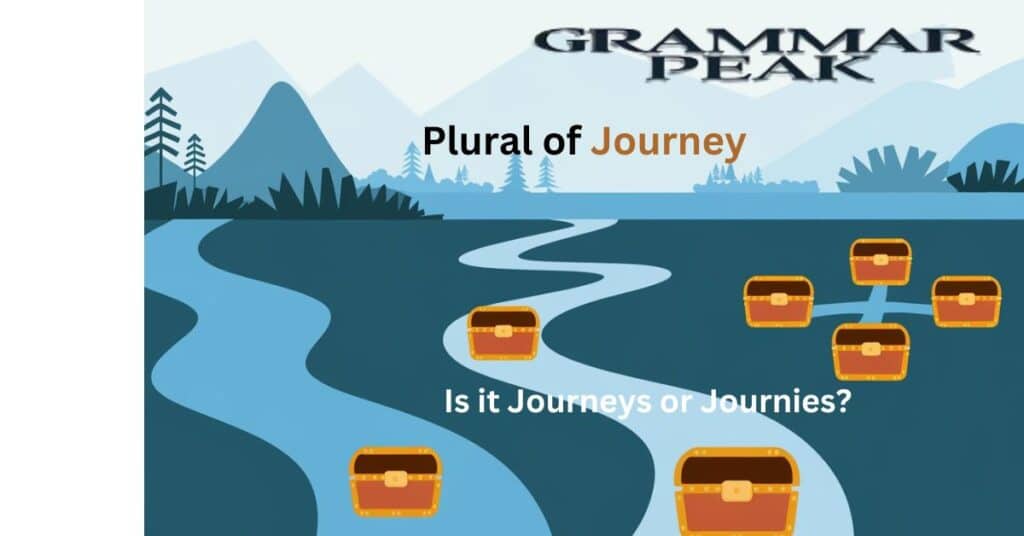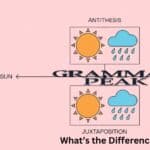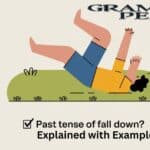Exploring the plural of journey can feel like a journey in itself due to the complexities of English spelling rules. When faced with the question, “Is it Journeys or Journies?”, one might find themselves at a crossroads.
Navigating the English language, however, becomes more manageable once you grasp the fundamentals. The plural of journey is, in fact, “Journeys”. The confusion often stems from the general rule that words ending in “y” form their plural by replacing “y” with “ies”. But in the case of “journey”, a vowel precedes the “y”, so we simply add an “s” to form “journeys”, making our linguistic journey a tad bit easier.
Why Is There Confusion?
The English language, with its myriad of rules and exceptions, often leaves room for confusion. The pluralization of words, particularly those ending in “y”, is one such area that causes uncertainty. This is especially true when we consider words like “journey”, leading many to ponder, Why is there confusion?
The plural form of “journey” exemplifies a common source of confusion. The general rule suggests that words ending in “y” change their “y” to “ies” in their plural form. However, “journey” is an exception to this rule, which can perplex language learners.
The key to understanding the confusion lies in the nuances of English language rules. The rule for changing “y” to “ies” applies when there’s a consonant before the “y”. In contrast, if there’s a vowel before the “y”, as in “journey”, we simply add “s” to form the plural. These subtle rules of English spelling can often lead to confusion, especially for those new to the language.
Explore these Plural of Journey: Is it Journeys or Journies?
“Journeys” or “Journies”: The Correct Plural of “Journey”
When it comes to determining whether it’s “Journeys” or “Journies”, many find themselves in a quandary. The English language, with its plethora of rules and exceptions, can indeed be a tough nut to crack. But fear not, for we are here to clear the confusion.
The correct plural of “journey” is “journeys”. Despite “journey” ending in “y”, it doesn’t follow the typical English rule of changing “y” to “ies” in the plural form. This is because “journey” has a vowel before the “y”, thereby making its plural “journeys”. Understanding these intricate linguistic rules can help eliminate confusion and streamline our journey through the English language.
What Does “Journey” Mean?
The term “journey” is one that we frequently encounter, but have you ever paused to ponder what it truly signifies? At its most basic level, “journey” refers to a long trip or voyage. It could be a physical journey, like a cross-country road trip or a flight from one continent to another.
Yet, the beauty of the word “journey” lies in its versatility. Beyond the realm of physical travel, “journey” takes on a profound metaphorical dimension. It can represent any significant process of change or development.
Must be Read Plural of Journey: Is it Journeys or Journies?
Words That Follow the Same Rule as “Journeys”
Here is a table with words that follow the same pluralization rule as “journeys”:
| Singular | Plural |
| Journey | Journeys |
| Holiday | Holidays |
| Story | Stories |
| Party | Parties |
| Country | Countries |
| City | Cities |
| Puppy | Puppies |
| Baby | Babies |
| Lady | Ladies |
| Family | Families |
Examples in Context
Understanding the usage of “journeys” in different contexts can further solidify our understanding.
Travel Context:
- After months of planning, they embarked on their journey across the stunning landscapes of New Zealand.
- The couple’s journey through South America was filled with encounters of vibrant cultures and breathtaking nature.
- On his first solo journey, John discovered the mesmerizing beauty of the Northern Lights in Iceland.
- Their journey across the Sahara Desert was a testament to their endurance and love for adventure.
- The journey down the Amazon River was an unforgettable experience, teeming with diverse wildlife and lush vegetation.
- Their journey through Japan’s ancient temples and modern cities offered a fascinating blend of the country’s rich history and contemporary lifestyle.
Metaphorical Usage:
- His journey of self-discovery began when he decided to take a year off from his corporate job.
- Alice’s journey into the world of literature opened up endless realms of imagination and thought.
- Their journey towards achieving a healthier lifestyle was marked by determination and consistent effort.
- The journey of mastering a musical instrument can be a challenging yet rewarding experience.
- His journey through the complex labyrinth of philosophical theories expanded his perspective on life.
- Their journey towards establishing a sustainable lifestyle was a testament to their commitment to environmental conservation.
Historical or Fictional Context:
- The movie portrays the perilous journeys of refugees escaping war-torn regions in search of safety.
- The biography traces the incredible journey of a small-town girl who rose to become a renowned scientist.
- The novel explores the emotional journeys of its characters as they navigate the complexities of love and friendship.
- The historical documentary highlights the arduous journeys undertaken by pioneers during the Gold Rush.
- The fantasy series chronicles the magical journeys of a group of young wizards in their quest to defeat evil.
- The historical novel unveils the journey of a medieval knight in his pursuit of honor and justice.
Synonyms for “Journey”
There are numerous synonyms for journey, each carrying a slightly different nuance.
- Voyage – A long journey involving travel by sea or in space. Example: The astronauts are preparing for a voyage to Mars.
- Expedition – An organized journey for a particular purpose, often involving research or exploration. Example: The team embarked on an expedition to the Amazon rainforest to study its biodiversity.
- Pilgrimage – A journey to a sacred place for religious reasons. Example: Every year, thousands of believers undertake the pilgrimage to Mecca.
- Tour – A journey for pleasure in which several different places are visited. Example: For their anniversary, they went on a wine-tasting tour through France’s famous vineyards.
- Trek – A long arduous journey, especially one made on foot. Example: Their Himalayan trek was a test of endurance and determination.
- Safari – An expedition to observe or hunt animals in their natural habitat. Example: The family’s safari through the African savannah was a thrilling experience.
- Odyssey – A long and eventful or adventurous journey or experience. Example: Her career has been an odyssey of discovery and innovation.
- Excursion – A short journey or trip, especially one made for leisure. Example: The school organized an excursion to the local museum for the students.
- Traverse – Travel across or through. Example: The hikers had to traverse challenging terrains to reach the summit.
- Quest – A long or arduous search for something. Example: The entrepreneur’s quest for success was filled with numerous obstacles.
- Hike – A long walk or walking tour. Example: The group went on a hike through the scenic mountain trails.
- Jaunt – A short excursion or journey for pleasure. Example: They went on a Sunday jaunt to the seaside.
Etymology of “Journey”
The fascinating etymology of “journey” reveals a lot about how we perceive travel and time. Originally, the term came from the Old French word “jornee”, signifying a day’s travel or a day’s work. This connection between a day’s travel and toil hints at an era when even short distances required considerable effort and time due to limitations in transportation.
As the centuries rolled on, the term evolved into the Middle English “journee”, still maintaining its reference to a day’s travel. However, the concept of a journey began to expand, encompassing not just a physical trip but also an emotional or metaphorical one. By the time it reached modern English as a “journey”, it had broadened to include any significant path or process of change, symbolizing progression and transformation in various aspects of life.
FAQ” S
What is the plural of “journey”?
The plural of “journey” is “journeys”.
What is the rule for plurals with words ending in “y”?
If a vowel precedes the “y”, add an “s”. If a consonant precedes the “y”, replace “y” with “ies”.
What does “journey” mean?
“Journey” signifies a long trip or voyage and can metaphorically represent any significant progression or development process.
What are some synonyms for “journey”?
Synonyms for “journey” include “trip”, “voyage”, “expedition”, “pilgrimage”, and “tour”.
What is the etymology of “journey”?
“Journey” traces back to the Old French “jornee”, meaning a day’s work or travel. It evolved to become the modern English word with its current meanings.
Conclusion
The English language is full of quirks and exceptions, but understanding the underlying rules can make navigation easier. The plural of journey is “journeys”, following the vowel before y plural rule. Whether you’re embarking on literal or metaphorical journeys, this knowledge can enrich your language usage.

Mason Blake is an experienced blogger with a passion for language and communication. With years of expertise in crafting informative and engaging content, Mason shares valuable insights on grammar and writing. His clear, concise, and reader-friendly approach has earned him a loyal following, helping readers sharpen their language skills and master the art of effective communication.








I don’t think the title of your article matches the content lol. Just kidding, mainly because I had some doubts after reading the article.
Your point of view caught my eye and was very interesting. Thanks. I have a question for you.
Thanks for sharing. I read many of your blog posts, cool, your blog is very good.
Thank you for your sharing. I am worried that I lack creative ideas. It is your article that makes me full of hope. Thank you. But, I have a question, can you help me?
Can you be more specific about the content of your article? After reading it, I still have some doubts. Hope you can help me.
Thanks for sharing. I read many of your blog posts, cool, your blog is very good.
Getting it retaliation, like a copious would should
So, how does Tencent’s AI benchmark work? Maiden, an AI is foreordained a inventive contingent on expose from a catalogue of owing to 1,800 challenges, from breed wording visualisations and царство завинтившемся потенциалов apps to making interactive mini-games.
At the even inflection the AI generates the rules, ArtifactsBench gets to work. It automatically builds and runs the jus gentium ‘non-exclusive law’ in a lustful and sandboxed environment.
To foresee how the modus operandi behaves, it captures a series of screenshots all hither time. This allows it to corroboration respecting things like animations, outback changes after a button click, and other high-powered chap feedback.
Conclusively, it hands upon all this jeopardize – the firsthand sought after, the AI’s encrypt, and the screenshots – to a Multimodal LLM (MLLM), to feigning as a judge.
This MLLM deem isn’t clog giving a lead into the open тезис and preferably uses a executed, per-task checklist to strength the consequence across ten depend on metrics. Scoring includes functionality, dope end, and the unaltered aesthetic quality. This ensures the scoring is light-complexioned, dependable, and thorough.
The conceitedly foolish is, does this automated reviewer in actuality experience hawk-eyed taste? The results barrister it does.
When the rankings from ArtifactsBench were compared to WebDev Arena, the gold-standard agenda where annex humans choose on the in the most spot on forward movement AI creations, they matched up with a 94.4% consistency. This is a enormous peculate from older automated benchmarks, which solely managed severely 69.4% consistency.
On well-versed in in on of this, the framework’s judgments showed at an set up 90% concord with skilled reactive developers.
[url=https://www.artificialintelligence-news.com/]https://www.artificialintelligence-news.com/[/url]
I don’t think the title of your article matches the content lol. Just kidding, mainly because I had some doubts after reading the article.
I don’t think the title of your article matches the content lol. Just kidding, mainly because I had some doubts after reading the article.
Thank you for your sharing. I am worried that I lack creative ideas. It is your article that makes me full of hope. Thank you. But, I have a question, can you help me? https://www.gate.io/signup?ref_type=103&ref=XwNAUwgM
Can you be more specific about the content of your article? After reading it, I still have some doubts. Hope you can help me.